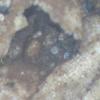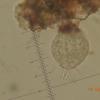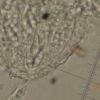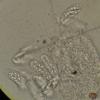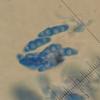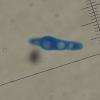
20-01-2026 17:49
 Hardware Tony
Hardware Tony
I offer this collection as a possibility only as e

15-01-2026 15:55
 Lothar Krieglsteiner
Lothar Krieglsteiner
this one is especially interesting for me because

17-01-2026 19:35
Arnold BüschlenHallo, ich suche zu Cosmospora aurantiicola Lite

16-01-2026 00:45
Ethan CrensonHi all, On decorticated hardwood from a New York

18-01-2026 12:24
Hello.An anamorph located on the surface of a thin

08-12-2025 17:37
 Lothar Krieglsteiner
Lothar Krieglsteiner
20.6.25, on branch of Abies infected and thickened
Acanthostigmella
Eduard Osieck,
23-04-2015 20:19
Minute hyaline perithecia (0.05-0.06 mm) with hyaline setae (20-23 um).
Bitunicate asci (30-40 x 10 mu) with 3-septate hyaline spores with big guttules: 13-16 x 4-5 um. One median cell larger than the other.
Substrate: Lophiotrema cf. neohysterioides (= curreyi) and on bark of Hedera.
I assume this belongs to the genus Acanthostigmella.
With the key included in the paper of Barr 1977 it easily keys out as A. pallida but this species has much smaller spores (7-10 X 2.5-3.5 um) and smaller ascii (20-25 x 10-11 um).
Six years later (Barr & Rogerson 1983) described A. brevispina (also known as Tubeufia brevispina) as a new species with spores which are more in agreement with my find: 14-18 x 4-5 um. However this species has larger ascii (50-60 mu) and also much larger perithecia (diameter 0.13-0.18 mm).
Belongs this find to Acanthostigmella? And what about the species?
I hope somebody has some knowledge about this species although the Ascofrance database does not contain any finds.
Eduard
Björn Wergen,
01-05-2015 00:01

Re : Acanthostigmella
Hi Eduard,
do you still have a piece of this collection for studying?
regards,
björn
do you still have a piece of this collection for studying?
regards,
björn
Eduard Osieck,
01-05-2015 15:23
Re: Acanthostigmella
Hi Björn,
Yes the material is still in good condition, the perithecia have even multiplied over a larger area of the (not dead) Hedera twig. Apparently the ascomata become pale brownish after some time. Some ascomata are larger than indicated, up to 0,10 mm, but still smaller than in Barr's description of A. brevispina. However, I have found also much longer ascii, up to 64-75 um. They seem to stretch outside the perithecia. So it might very well be this species or a yet undescribed European counterpart. Particularly striking is the enlarged median cell ("2e loge sporale nettement renflee", quoted from Holm 1957).
I will send you the material today, than we get at least splendid photos :)
EDuard
Yes the material is still in good condition, the perithecia have even multiplied over a larger area of the (not dead) Hedera twig. Apparently the ascomata become pale brownish after some time. Some ascomata are larger than indicated, up to 0,10 mm, but still smaller than in Barr's description of A. brevispina. However, I have found also much longer ascii, up to 64-75 um. They seem to stretch outside the perithecia. So it might very well be this species or a yet undescribed European counterpart. Particularly striking is the enlarged median cell ("2e loge sporale nettement renflee", quoted from Holm 1957).
I will send you the material today, than we get at least splendid photos :)
EDuard


